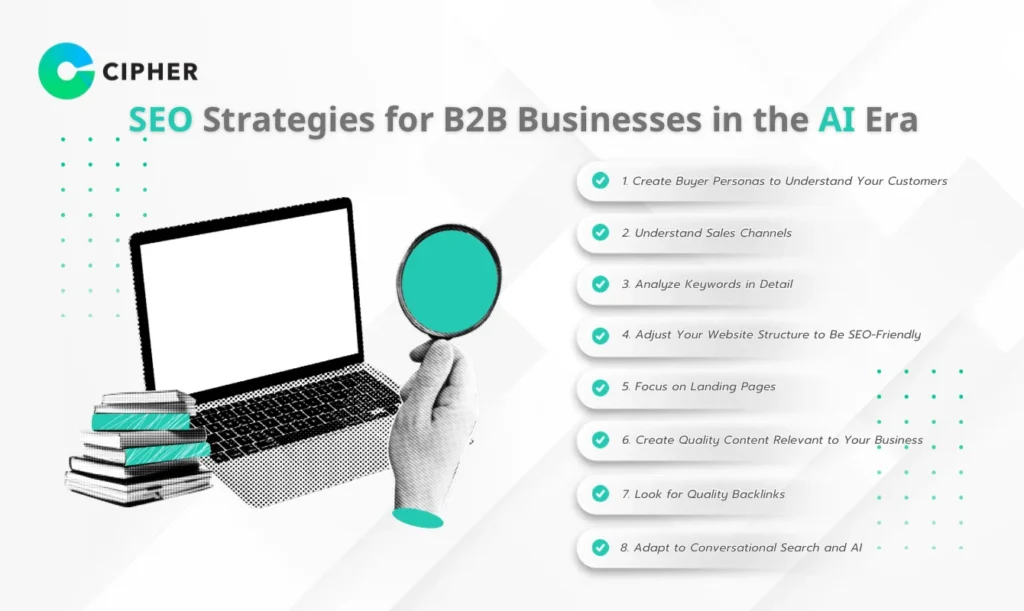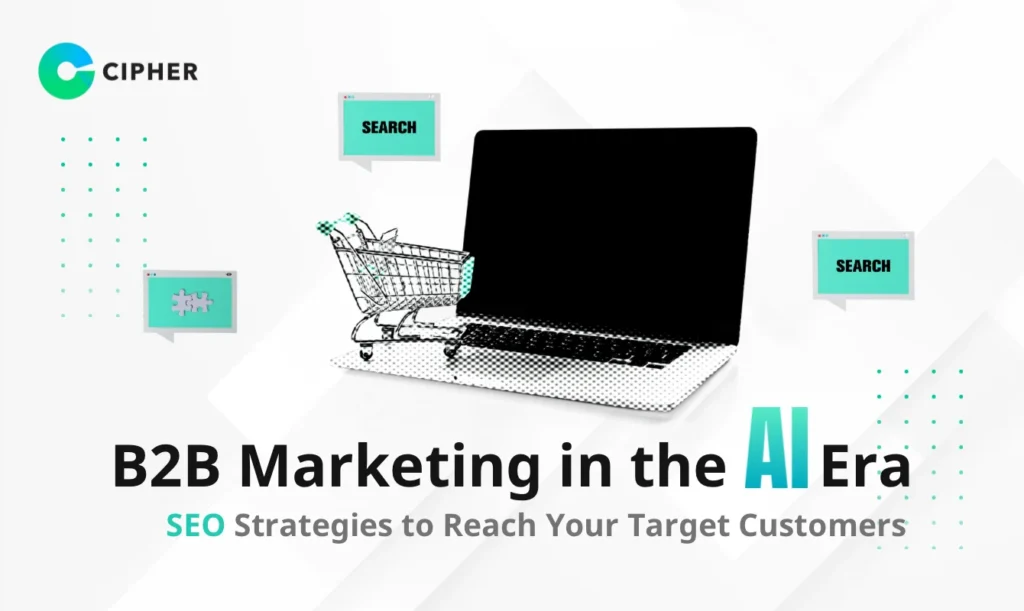In today’s highly competitive business world, B2B Marketing must adapt to rapidly changing technologies, especially as AI plays an increasingly crucial role in information search. Businesses in the B2B market need to understand and adjust their SEO strategies to precisely reach their target customers. This article will guide you through understanding effective B2B marketing strategies in the AI era and how to implement powerful SEO techniques that drive results for B2B businesses.
Table of Contents
Understanding B2B Business: What Is It?

B2B Marketing stands for Business-to-Business Marketing—a marketing model where transactions occur between business organizations, with both buyers and sellers being business entities. The objective is to meet various business needs, whether for raw materials, production equipment, services, or sales channel management.
In the B2B market, transaction volumes are typically large, as they involve raw materials or products used in production or resold to general consumers. This differs from B2C (Business-to-Consumer) businesses that sell products directly to consumers. For a comprehensive understanding of B2B marketing fundamentals, it’s essential to recognize these key differences.
What is B2B Marketing? How Does It Differ from B2C?
B2B Marketing refers to marketing from one organization to another or from business to business. The goal is to make other businesses more familiar with your brand and develop them into partners or customers.
Key differences between B2B Marketing and B2C Marketing:
- Decision-making process: In B2B Marketing, purchasing decisions are more complex and time-consuming because they often involve high values and must go through multiple stages before a decision is made. Decision-makers may include multiple people, such as procurement teams, engineers, and executives, each with specific goals like cost reduction, efficiency improvement, or profit generation.
- Purchase objectives: In the B2B market, purchasing decisions focus on direct and indirect business performance, while B2C consumers typically make purchases to meet personal needs and satisfaction.
- Keyword volume: B2B Marketing typically involves fewer relevant keywords than B2C, as their products and services are more specialized (Niche Products & Services). Although they have lower search volumes, selecting keywords that match customer needs can make SEO efforts successful.
- Expertise: B2B Marketing must demonstrate higher expertise because expertise is a key factor in building credibility and trust, convincing customers that your products or services can solve their business problems.
Why Should B2B Businesses Prioritize Online Marketing?
While businesses in the B2B market often emphasize offline marketing such as direct customer visits, trade shows, or print media, online B2B Marketing has become essential in today’s digital age for several important reasons:
- Opening trade opportunities to increase sales: When people need information about products or services, Google is the first tool they use. Having your website rank high in search results increases opportunities to reach target customers who are looking for your products or services.
- Building credibility: In the digital age, not having an online presence may reflect outdatedness and lack of credibility, especially for businesses in B2B Marketing that rely heavily on credibility and the ability to communicate product information effectively. A professionally designed website with comprehensive information will help create a good first impression with visitors.
- Reaching a wider target audience: Online B2B Marketing helps you reach customers in remote areas or other countries, which might be difficult or costly to reach through offline methods.
AI and the Changing World of Information Search
A Search World Transformed by AI
In the past, search engines looked for words or phrases that matched user search queries. But with today’s AI advancements, search tools can “understand” broader contexts, interpret complex meanings of questions, and recognize users’ true “search intent” with greater accuracy.
This change has affected how websites are ranked. Keyword stuffing no longer works. Today, rankings depend on how completely your content answers users’ questions, how credible it is, and how naturally it’s presented. Understanding AI SEO has become essential for businesses looking to stay competitive.
Search Behavior in the AI Era
AI also affects users’ search behavior:
- More natural conversations: Users are more comfortable using natural question sentences, not just short keywords anymore.
- Expect relevant and quick answers: Users expect to receive concise and to-the-point answers immediately, without wasting time reading multiple pages or websites.
- Looking for credible in-depth information: While speed is important, users still value deep information from credible sources.
SEO Strategies for B2B Businesses in the AI Era

1. Create Buyer Personas to Understand Your Customers
Creating buyer personas means modeling the characteristics or traits of your target audience to better understand and visualize your customers. Especially in B2B Marketing, where there are multiple purchasing decision-makers, it’s important to understand who these people are, what problems they have, and how they gather information.
Understanding B2B market customers in depth will help you strategize your marketing, choose keywords, and create content that meets the needs of your target audience. Many businesses have discovered that proper SEO implementation starts with understanding who you’re trying to reach.
Important Personas in B2B Purchasing Decisions
To succeed in B2B Marketing, you should understand the roles and needs of each persona involved in the buying decision, which typically includes:
- Decision Maker: Often senior executives with budget approval authority. They are interested in business outcomes such as ROI, cost reduction, efficiency improvement, and long-term vision. Communication strategies should focus on business value and financial impact.
- Technical Influencer: Often engineers or industry specialists who provide technical advice and product specifications. They are interested in technical details, standards, quality, and product efficiency. Communications should delve into details and present accurate technical information.
- End User: Those who will directly use your product or service. They are interested in ease of use, features that help them work better, and after-sales support. Communications should emphasize real-world benefits and solutions to problems they face.
- Procurement: Responsible for negotiating and managing the purchasing process. They are interested in price, contract terms, supplier reliability, and compliance with company policies. Communications should be clear, straightforward, and demonstrate value.
- Initiator: The person who starts the process of finding a solution to an identified problem. They could be anyone in the organization who recognizes a need or problem. They need basic information that helps identify the problem and possible solutions. Communications should provide easy-to-understand and relevant information.
Creating content and planning B2B marketing strategies that address each persona group will help you communicate effectively throughout the Customer Journey and increase opportunities to close sales.
2. Understand Sales Channels
Before starting SEO, you should clearly understand your business’s sales process, including channels, purchasing steps, and contact methods. The best way is to ask your sales team directly, as they meet with customers the most.
Use the information gathered to analyze frequently asked questions from customers, decision timeframes, and common problems to develop targeted SEO strategies.
3. Analyze Keywords in Detail
Detailed keyword analysis is the heart of SEO for B2B Marketing. Choose keywords that your target audience uses to search for your business, considering:
- Keywords directly related to your products or services
- Keywords related to problems businesses want to solve
- Keywords customers use to search for in-depth information about products or services
Although B2B market keywords may have lower search volumes, they often have higher buying intent and less competition, which is a good opportunity for SEO. Tools like Ahrefs can help identify valuable B2B keywords with the right balance of search volume and competition.
4. Adjust Your Website Structure to Be SEO-Friendly
A good website structure helps both users and search engines understand what your website is about and how content is interconnected. A good structure should have:
- Information grouped into the same categories
- Content organized from overview to more specific content
- No more than 5 clicks from the homepage to access any content
Improving your website structure also enhances User Experience, which is an important factor in Google’s ranking. Many B2B companies use Yoast SEO to optimize their WordPress websites for better structure and readability.
5. Focus on Landing Pages
The main purpose of landing pages is to convert visitors into leads or customers. You should set clear goals for what you want visitors to do, such as filling out contact information or viewing product details.
Landing pages should have clear Call-to-Action (CTA) buttons so visitors understand what to do next and act according to your objectives.
6. Create Quality Content Relevant to Your Business
Quality and useful content is a key factor in Google rankings. In addition to using appropriate keywords, B2B Marketing should create content that:
- Is specific and demonstrates expertise in your business
- Provides useful information to your target audience in the B2B market
- Answers questions or solves problems your target audience is facing
Examples of appropriate content for B2B Marketing:
- Industry trend analysis articles
- Customer success case studies
- Business problem-solving guides or manuals
- Comparisons of pros and cons of different solutions
7. Look for Quality Backlinks
Backlinks, or links from other websites to yours, are an important factor in SEO ranking. Focus on quality rather than quantity, trying to get backlinks from websites that:
- Are relevant to your industry
- Are credible and have been established for a long time
- Update content regularly
Methods to acquire quality backlinks may include writing guest posts, creating valuable content that others want to share, or partnering with related businesses.
8. Adapt to Conversational Search and AI
In an era where AI plays a key role in search, businesses focusing on B2B Marketing should adjust their B2B marketing strategies to accommodate:
- Voice Search: Adapt content to answer natural questions that users typically ask through voice search
- Conversational Search: Create content that answers questions directly and clearly, making it easy for AI to extract information
- Using AI for Data Analysis: Use data analysis tools to understand user behavior and improve SEO strategies for greater efficiency
Comprehensive B2B Marketing Solutions from CIPHER
Analyzing B2B Markets with Digital Analytics
Comprehensive B2B Marketing Solutions
As your digital marketing partner, we offer comprehensive services to help businesses in the B2B Marketing space achieve their business goals:
- Specialized B2B SEO: Customize SEO strategies to suit the specific characteristics of your B2B market to be discovered by purchasing decision-makers
- B2B Website Development: Design and develop websites that are not only beautiful but also have SEO-friendly structures and focus on generating quality leads
- Inbound Marketing for B2B: Plan attraction marketing strategies focusing on customers likely to be interested in your products and services
- Marketing Automation: Use automated marketing technology to efficiently manage relationships with B2B customers, from attracting new customers to retaining existing ones
- Content Marketing for Experts: Create content that demonstrates your expertise and meets the needs of your B2B target audience
- AI SEO for B2B Businesses: Use the latest AI technology to analyze search behavior and keep B2B marketing strategies up-to-date
Conclusion
B2B Marketing in the AI era requires adapting to rapidly changing technology and consumer behaviors. The key is to focus on real value for customers, create high-quality content that meets needs and demonstrates industry expertise, use digital data analysis to understand customer behavior, and adapt B2B marketing strategies to AI operations. At CIPHER, we are ready to be your partner in helping your B2B market business grow with modern B2B marketing solutions. Contact us today for a customized quote tailored to your needs.





